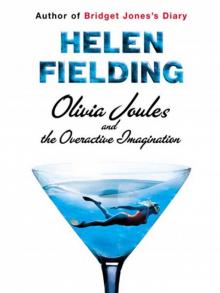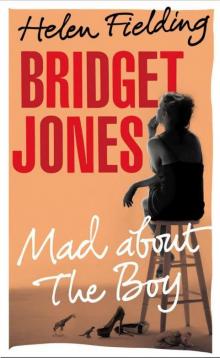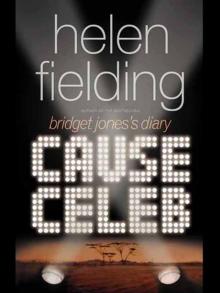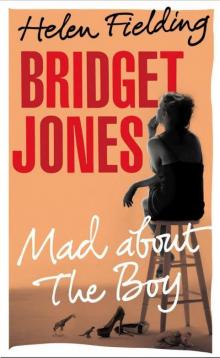- Home
- Helen Fielding
Cause Celeb Page 17
Cause Celeb Read online
Page 17
It wasn’t like I expected, being in a war. At home I had vaguely imagined, without thinking it through, that a war meant fighting all the time, like in the First World War trenches, and that if you went to a war zone you would run a continual gamut of bullets. This was probably because the only bits you tended to see on the news were the shootings. Here, it felt as though life was more or less normal apart from danger spots, places you didn’t go, things you didn’t do—like playing on motorways. Of course it was the unexpected, the blast from nowhere, that made it lethal. But, in between, you just carried on as normal and bought bread.
We followed the main street right down to the edge of the gorge, and there I saw the remains of the bombed-out bridge, a thick concrete column set into the rocks below, with a tangle of rusting steel supports sticking out. The cliff did not fall sheer: there was a footpath down to the bottom two hundred yards below, crisscrossing the red rocks like a mini–mountain pass. The river was a frothy ribbon, meandering between shingle beaches and broad stretches of grass. I thought, for a split second, that it looked a nice place to camp.
We turned left along the edge and then back up the slope again and into a compound where I saw the RESOK sign and a couple of Land Rovers parked outside. Inside, the walls were covered with Keftian art, primitive drawings of the war. I had seen these paintings before. Sometimes there were Keftian art exhibitions in a community hall in Sidra which had been built by the Japanese in the sixties.
The man I needed to see was the head of RESOK for the Adi Wari region, Hagose Woldu, whose name had often come up in discussions in the camp. It turned out he had just left to go to the KPLF office. So we went back there to find that he had left to come and meet us at RESOK. So we set off again. When we got back to RESOK he gave me a most warm and gratifying greeting.
“Miss Rosie, it is my great honor to meet you. We are most grateful for your work with our people in Safila.”
Hagose was a very tall man indeed, dressed in brown polyester trousers, which were much too short for him, and a very old mock denim shirt with floral cuffs and collar.
He took me to a room where a relief model of Kefti was laid out on a large table, the highlands forming a doughnut shape, the desert in the center, and lowlands on the outside, crossed by the riverbeds. You could see the Adi Wari gorge where we were. The highlands beyond were crevassed with great fissures. An extraordinary oval plateau was surrounded by cliffs on all sides.
Hagose had placed model huts in various sizes, like Monopoly houses, all over the mountains and lowlands to show the population distribution; with red flags to show the current areas of fighting, and green flags to show where the locusts were hatching. There were green flags all over the desert area in the center and the lowlands which ringed the mountains. They were in clusters along the coast, in clusters at the river mouths, and following the course of the riverbed in the plain beyond the gorge. I asked him how he had gathered all this information without aerial surveillance. Hagose claimed it was by word of mouth. He said that the locusts in the desert center were swarming and moving west and crops were already disappearing in the western highlands. He said that the population was already beginning to move the length of the country.
It was difficult to know how much to believe because he had everything to gain by sending me back in a breathless state declaring an emergency. I thought about what Gunter had said at the embassy party and wondered. But all I needed to know about was the area which fed Safila. If I saw refugees moving there on the routes to us, then I would know what I was dealing with.
Directly east of Safila there was a break in the first ridge of mountains—the Tessalay pass. This was where some of the most dramatic scenes of the mid-eighties exodus had been filmed for TV.
Hagose made much of their lack of wherewithal to deal with the infestations. The Keftians didn’t have any pesticide and even if they had had planes, it was too risky to fly. At the moment they were trying to deal with the swarms by beating them off with sticks, digging trenches in between the crops and filling them with fires. Apparently, the Aboutians had bombed two villages making these sorts of preparations. Hagose wanted an amnesty to be declared, and the UN to come in and spray. Too late, too late, I thought. It would take three months to set that up.
Hagose was going to send a RESOK official into the highlands with us, and send word ahead to the villages we were going to visit. He said he would go over to the KPLF and talk to them about the route.
Belay and I went to the hospital. Muhammad was asleep, they told me, and O’Rourke had gone off to find us. It was a typical afternoon of confusion. I left a message that I would be at the KPLF ready to go between four and five. And went shopping.
I bought bread, tomatoes, grapefruit, and tinned cheese. It was cloudy now, and gray. I caught a gust of wind and shivered. I bought some blankets as well. Belay left me to visit a relative. As I walked up to the KPLF I could see O’Rourke with a group of soldiers, peering under the back of the vehicle, checking something.
“So you reckon you can get another truck?” O’Rourke was saying to one of the soldiers, as we approached.
“Yes, I think it is possible.”
“How long will that take?”
“I think we will be finding one at Gof.”
“No. Not at Gof. What I am saying is that I do not want to set off in this vehicle. The back axle is fucked. Do you have another vehicle in Adi Wari?”
“It is possible.”
O’Rourke saw me and nodded. His patience seemed to be wearing thin. There was a heated discussion in Keftian among the soldiers. They were all leaning down and peering at the back axle. We edged away so we could talk without being overheard.
“I came to find you at the hospital,” I said. “What do you think about going on? They say it’s only four hours to where the locusts are. You don’t have to come, if you don’t think—”
“No, no, that’s fine,” he said. “I’ve talked to them. It sounds OK, but I’ll believe this four hours business when I see it. Listen, are you all right?” He touched my arm and rubbed it. “You’re frozen. Here take this.” He took off his jumper.
“What about you?”
“I’m fine.”
“But—”
“Just put it on, you’re shivering.”
It was a soft gray woolen jumper. I put it on. It smelt of him. I liked that.
“What’s happening with the truck?”
“It’s a heap. It’ll pack up within five miles. We’ll have to wait for another.”
It seemed Muhammad was all right. O’Rourke had operated on the stump that afternoon. He had managed to save the knee. For just a moment I thought, Oh, God, are we being mad going on? Will that happen to me?
It was dark by the time they brought another truck. O’Rourke inspected it thoroughly with a torch, got them to change a tire and put another spare in. He was being very good.
It wasn’t four hours to the locusts, of course. We drove at a snail’s pace, with shades over the lights so that you could just see a dim glow on the ground directly ahead and two red glows beneath the taillights of the trucks in front. It was very, very cold. O’Rourke and I were in the cab of the third truck. I was in the middle, between him and the driver. We put the blankets round us and I tried to sleep by leaning my head back against the seat. He said, “You can lean on me.” I tried laying my head on his shoulder but it was uncomfortable and he sat up and put his arm round me and I slept then.
I woke up when we reached the crossing point. The road tipped at an unfeasible angle, the gears and engine straining. We stopped at the bottom and got out. There was no moon. It was chill and dank down there with the great cliffs looming above. I could hear the river off to our right. It sounded shallow, like a stream. I had bad pins and needles so that I could hardly bear to move my legs. I was very stiff. The back of my neck was jarred, and my mouth tasted filthy. I got back in the cab and ate some grapefruit and bread and drank some water and shivered. We set off
again in convoy, forded the river and climbed the other side of the gorge. When we were back on the level I dozed again.
At 4:00 A.M. we reached the dry riverbed where the grasshopper bands were supposed to be. It was still pitch black. We parked and waited. I got the camera ready.
The blackness was diluting. A patch of gray appeared ahead on the horizon. We were pulled up on the edge of a small hill with the shallow river basin before us and a broad escarpment, about fifty feet high, half a mile beyond.
Slowly detail edged out of the darkness, drained of color. I strained my eyes to see what was ahead and recoiled, stunned. The whole of the basin was alive, moving in waves. There was a carpet of insects half a mile across, covering the earth and the road ahead. They lay there, like something from a horror movie, glinting in the growing light.
A thin orange cusp appeared on the horizon. And as it rose the clouds tore open, letting color flood into the scene. As the first rays hit the carpet a shower of insects right across its surface fluttered up, dancing in the light like a snowstorm.
CHAPTER
Fifteen
We drove both ways along the edge of the escarpment, looking down onto the insect carpet. It stretched for five kilometers. At one point we walked down into it. The most unnerving thing was that the locusts didn’t react to us at all. They stayed put, clinging doggedly to the earth, even if we walked over them. They were like aliens with a secret common purpose. Occasionally, as the sun rose higher, a whole area of them would heave and shift for no clear reason. The man from RESOK picked a couple up and showed us their wings. They were ready to fly.
I was beginning to worry about how all this would translate into hard evidence. I wondered if our description and some odd-looking photographs would be enough—a carpet of insects is not ideal as a photographic subject. We put a few of the insects in a polythene bag to take back with us. I decided I should get some signed affidavits as well. Ideally, they should have been from disinterested parties. The trouble was, there were no disinterested parties.
The soldiers were getting jumpy about air raids so we drove five kilometers westward, to a village where there was an underground shelter. The village was fairly large: a huddle of about two hundred huts set in a little valley below us, with the dry yellow stalks of the crop growing in terraces all around. The people had started to harvest even though the crop was not ready, because as soon as the locust swarm moved, the wind would bring it this way.
There was frantic activity. The whole village was out in the fields. From a distance their curved backs moving up and down in the crop looked like maggots. They were harvesting strips in each field, starting to dig trenches in the bald patches left behind and filling them with straw, so if the locusts came they could light fires to protect the rest of the crop. The village sounds rose up at us, as we approached: a babble of voices, animal sounds, high-pitched cries from the children, a cock crow. It all seemed feeble and hopeless when you thought what they were up against. A couple of hours with a light aircraft and some pesticide could have solved it for them.
We were sitting in the KPLF compound, drinking tea in the shade, when a cloud passed over the sun. And at once a great cry went up outside, the high whooping sound the Keftians make when someone has died and we knew it was the locusts. We went outside the fence and saw that a shadow was creeping over the whole area.
Everyone was running towards the crop. The cloud came around us as we got there. The locusts felt like chips of wood, hitting your face, and any exposed part of you. Flames rose up from the trench directly ahead, and thick smoke followed as someone threw damp straw on top. It was almost completely dark. I abandoned the photographs for now, pulled my blue shawl over my head and ran into the field. There were figures everywhere, flailing at the air with beaters made from long sticks with a bundle of twigs tied at the end. Someone thrust a stick into my hands. I stopped to stare at a plant in front of me. Each of the narrow yellow leaves, and the pod of grain at the top, had seven or eight insects teeming over its surface. I watched one leaf disappear, with the locusts dropping below or fluttering up as it was finished. I started hitting the plant with the stick, over and over again, making it shake. The insects clung on, I couldn’t dislodge them. There was a great rushing roar all around. Immediately ahead, through the smoke, flames and darkness a thin old woman was beating at the plants. The brown cloth around her body had slipped down, her sagging breasts flapped in time with her beating. As I watched she let the stick fall from her hand. She raised one hand, formed it weakly into a fist and raised it. Then legs folded under her, as in a curtsy, she let herself fall to the ground, and rolled her head in the soil.
Four hours later there was nothing left of the crop. The people were out in the fields whooping, wailing, tearing their hair, beating their heads, raising their hands up and falling down to the ground in traditional histrionic public mourning. And as the sun bore down in the white midday heat, scorching the dry earth, shimmering on the horizon in a vicious mirage of water, you could understand their terror. The earth had nothing more to give for six months now. There was no more food.
We were supposed to be relief workers, but we were helpless. There we were, crawling on the surface of those tracts of dryness, watching a whole nation’s food drain away. What could we do? O’Rourke treated a few cases of burns and heat exhaustion. I took more photographs, feeling like a voyeur. We could only warn that there was little food to spare at Safila.
We slept in the underground shelter and drove on when it was dark. I hated the darkness now. Beyond the foothills, the road started to climb steeply. There were high mountain peaks all around us. The air smelt alpine. We climbed for a long way, then cleared a summit and dropped down again into a narrow valley, running at right angles to the road. We had the headlights on now that we were in the mountains. The Aboutians would not risk flying here at night, particularly when there was no moon.
Our driver suddenly held up his hand and said melodramatically, “Tessalay.”
Ahead of us was a wall of rock higher than anything we had come across before. A dip in this first range of peaks formed the start of the Tessalay pass—a four-mile corridor through the highest section of the western highlands. At this end the rocky corridor was closed off by a low ridge which formed the dip in the range. The road snaked up it and down the other side to enter it.
Before we even started to climb we were aware of figures moving along the edge of the road. A little group would be caught in the lights, with one of them leaning out into the road, hand raised, trying to flag us down. They did not look as though they expected us to stop since all they saw was KPLF trucks. The military had nothing to offer them. As we climbed the bends of the pass the numbers increased until there was a group every fifty feet or so at either side of the road. They all did the same thing as we passed, straightening up and raising a hand halfheartedly to stop us.
At the top of the pass all the vehicles stopped. I wished there was a moon, then, because it would have been an extraordinary view with the whole pass stretching below us, and I wanted to see the scale of the movement. The drivers tried to angle the lights so that we could see the figures climbing up from the floor of the pass. The people we were passing were not as bad as I’d feared. They were thin, but not starving, and they had possessions with them. I thought that maybe they had learned lessons from last time and decided to move while they were still strong enough to travel—but they had a long way to go to Safila. Tessalay was a dangerous place to be, because the Aboutians knew about the refugee movement and there were air raids most days. The road was impassable for vehicles now because of the bomb damage. The refugees traveled as far as they could at night and made for the underground shelters in the valleys off the pass, well before daylight.
It wasn’t long till dawn now. We thought we should set up in one of the shelters and do a survey. We found one just over the top of the ridge. It was cavernous, big enough to take all three of our vehicles. The ground at the entra
nce was covered in black engine oil and spare parts and military vehicles were everywhere. It was more like a mechanic’s shop than an air raid shelter. People were smoking even with all the oil about. I thought it was a death trap. I didn’t want to stay there. I said this to O’Rourke and he agreed.
In the end we drove as far as we could down the other side of the ridge until we came to a crater. We got out then, to walk to the next shelter, and left the drivers to take the trucks somewhere where they would be hidden and safe. It was a bit of a mistake to set off on foot, because as soon as the people saw that we were foreigners, who might have money or food we were mobbed. A crowd gathered around us quickly: crabby hands grabbed at my flesh and people were jabbing their fingers at their mouths aggressively. I wasn’t afraid because I had seen this before and it wasn’t that anyone meant us any harm. It was more of an elaborate pantomime.
The soldiers started hitting at the crowd with sticks. They weren’t hitting hard but, all the same, it meant that O’Rourke and I, caring angels from the West, were setting out through the mob to save the starving, while our soldier escorts cleared our path by thwacking at malnourished women and children. After fifteen seconds O’Rourke stood stock still and roared with the full depth of his voice: “WILL—YOU—STOP—THAT—BEATING.”
There was a stunned silence and the crowd fell away immediately around him.
“Put those sticks down,” he said, gesturing to the soldiers. “Put the sticks down.”
They looked at him as if he was mad, and held the sticks by their sides.
“Now clear a path,” he said, gesturing ahead of him at the crowd. “Make a path here, look,” and the crowd parted like the Red Sea so that we could make our way along. As we walked, I turned round to see that, sure enough, the soldiers had resumed their thwacking behind us, and some of the crowd were laughing.

 Bridget Jones's Diary
Bridget Jones's Diary Bridget Jones's Baby: The Diaries
Bridget Jones's Baby: The Diaries Olivia Joules and the Overactive Imagination
Olivia Joules and the Overactive Imagination Mad About the Boy
Mad About the Boy Cause Celeb
Cause Celeb Bridget Jones: Mad About the Boy
Bridget Jones: Mad About the Boy The Edge of Reason
The Edge of Reason Bridget Jones's Baby
Bridget Jones's Baby